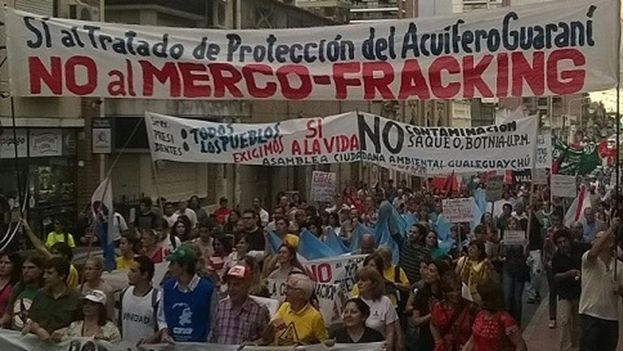
![]() 14ymedio, Yoani Sanchez, Havana, 22 June 2016 — Rupture can only be possible if there was once an agreement, a relationship or love. In the eyes of Latin America, Brexit seems like the story of a mature friend embroiled in the bitter litigation of a divorce, provoking a certain envy in those who have never managed to mate. In this world, while some arrange their departure from an alliance, others yearn for the marriage of an agreement.
14ymedio, Yoani Sanchez, Havana, 22 June 2016 — Rupture can only be possible if there was once an agreement, a relationship or love. In the eyes of Latin America, Brexit seems like the story of a mature friend embroiled in the bitter litigation of a divorce, provoking a certain envy in those who have never managed to mate. In this world, while some arrange their departure from an alliance, others yearn for the marriage of an agreement.
When the British vote this Thursday on a referendum to decide whether the United Kingdom will remain in or leave the European Union, the major impact of in Latin America should be a reflection on unitary structures, their reason for being and their fragility. On a continent where, in recent years, there have been innumerable groups, alliances and regional councils, each one more ineffective than the last, comparisons are inevitable.
The dozens of entities and coalitions, whose initials, logos and premises surround us everywhere in Latin America, pompously hold inaugural summits with family photos filled with heads of state, but in practice and in real life they are of very little use. Latin America has not even achieved full freedom of movement for its citizens within its own borders, a theme that takes on a seriousness in the face of the strict requirements Cubans need to meet to visit neighboring countries.
The history of the political community called the European Union, even if one of its parties chooses to leave this week, is that of the hard road of conciliation, the journey of dialog with all its obstacles and its search for points in common. Why haven’t Latin Americans extended an embrace in our area to create a legal framework that facilitates easier migration, investment and exchanges for our inhabitants?
Few areas on this planet show so many linguistic, cultural and historical similarities as that found between the Rio Grande and Patagonia. These similarities make the fragmentation exhibited in so many regulations increasingly incomprehensible, in an area where many governments have chosen to join in their “little groups” based more on ideological affinities than on their responsibilities to their peoples.
The reason for so much disunity – contrary to the common points of our identity that work to bind us together – are a sign of the egotism of the executives and the shortsightedness of the foreign ministries.
The Community of Latin American and Caribbean States (CELAC), created to emulate the Organization of American States (OAS) while leaving out the “uncomfortable” United States and Canada, does not advance beyond symbolic statements. At its last meeting in Ecuador, held in January, its most “concrete” achievement was to express support for the states participating in the Colombia peace process and to congratulate the government of Juan Manuel Santos. After long organization and with the concurrence of the delegates from the 33 member countries, the intergovernmental organization didn’t move beyond paraphernalia to results and was incapable of taking on and proposing solutions to the great challenges of the continent.
Even worse has been the outcome of the Bolivarian Alternative for the Americas (ALBA), inflated by the temperament of a populist politician who thought he could redesign his country and go on to define the contours of the map of Latin America. With the death of former Venezuelan president Hugo Chavez, this regional entity, defined by ideological exclusion and political commitment in exchange for oil, is like a pricked balloon: it has deflated.
Even the Central American Integration System (SICA) demonstrated its ineffectiveness during the Cuban migrant crisis which, in late 2015, raised the political temperature on the border between Costa Rica and Nicaragua. Tension over the unilateral decision of Daniel Ortega to close his border to Cubans caused Costa Rican President Luis Guillermo Solis to declare that “Costa Rica can not participate in these conditions in an Integration System that ignores solidarity.”
Mercosur, the alliance the has come closest to achieving the free movement of goods and services between its member states, is also faltering because it became too incestuous and too dependent on Brazil’s Planalto Palace, from which President Dilma Rousseff, one of its principal supporters, has departed as of a few weeks ago, in the midst of process in which she is accused of trying to disguise the country’s budget deficit.
Amid the rubble of so many failed organisms and so many acronyms condemned to the dustbin of history, the Pacific Alliance, comprising Chile, Mexico, Peru and Colombia, has chosen to “make it on their own” in a region where agreements are here today and gone tomorrow and organized groups bear more resemblance to gangs than to functional entities.
This Thursday, when the British decide to leave or remain in the European Union, at least they will have known the taste of coexistence, the bittersweet contrast that defines every marriage. We in Latin America remain chronically single, looking enviously toward the altar.
